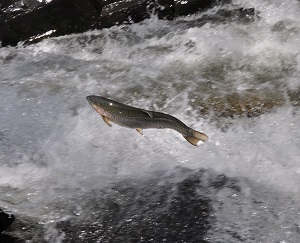Recent Bear Incidents Highlight Need for Residents to Stay ‘Bear Smart’
One careless resident can cause problems
for the entire community
MONTPELIER,
Vt – As incidents of bears breaking into homes, garages, sheds and vehicles in
Vermont increases, so too should efforts by residents to bear-proof their homes
and secure potential outdoor food sources that can attract bears.
While
searching for food in early July, one bear broke into a Killington home through
an open window, and another Killington bear entered the Northstar Lodge through
an open door. A Pownal woman awoke to the sound of a bear breaking through a
kitchen window to access a honey comb that had been left within reach, while a
similar incident occurred in Townsend where a bear broke into a kitchen
freezer.
According
to Vermont State Game Warden Sergeant Chad Barrett, bears don’t naturally break
into homes. They must first have had experience receiving food from humans. The
process of habituation begins with attractants that residents leave out such as
birdseed, pet food, or unsecured garbage.
“When
bears get into garbage, pet food, beehives, and birdfeeders without any
consequences, their behavior escalates as they lose fear of humans and begin to
cause more damage,” said Barrett. “Once a bear is conditioned to associate
people with food, little can be done to fix the problem. Relocating bears is
ineffective. Bears that have been lured into a neighborhood by one careless
resident quickly become a problem for the entire community.”
Some bears
have also taken to entering cars in search of food, including a bear in Warren
this past week that became trapped in a car. To protect human safety, Barrett
ultimately had to shoot the bear, which is the unfortunate result of many of
these cases.
While
nobody was harmed in any of these incidents in Vermont, a New Hampshire woman
was badly injured when a bear entered her home early on the morning of July
17.
If a bear
enters a home, Barrett urges people to get to a safe place and call 911. If a
bear is near the house or is attempting to make entry, he recommends people
make as much noise as they can to scare it off.
In
addition to removing birdfeeders and securing garbage, Barrett recommends
residents avoid giving bears an easy entrance by locking doors and shutting
downstairs windows at night. Motion-activated lights and alarms can also be
used to deter bears that wander too close to homes.
The
Vermont Fish & Wildlife Department is asking the public to report all bear
conflicts to the department’s website at www.vtfishandwildlife.com. Reporting an incident helps track
problem areas and allows wardens or biologists to advise residents on ways to
mitigate the problem. Residents are reminded that it is now illegal to feed
bears in Vermont, even unintentionally.
“Black bears
naturally search for food. That behavior will not change,” said Barrett.
“It’s the people’s responsibility to keep human food inaccessible, so that
bears remain healthy and wild.”
For Immediate Release: August 2, 2018
Media Contacts: Forrest Hammond, 802-777-7493; Col. Jason Batchelder, 802-828-1529



